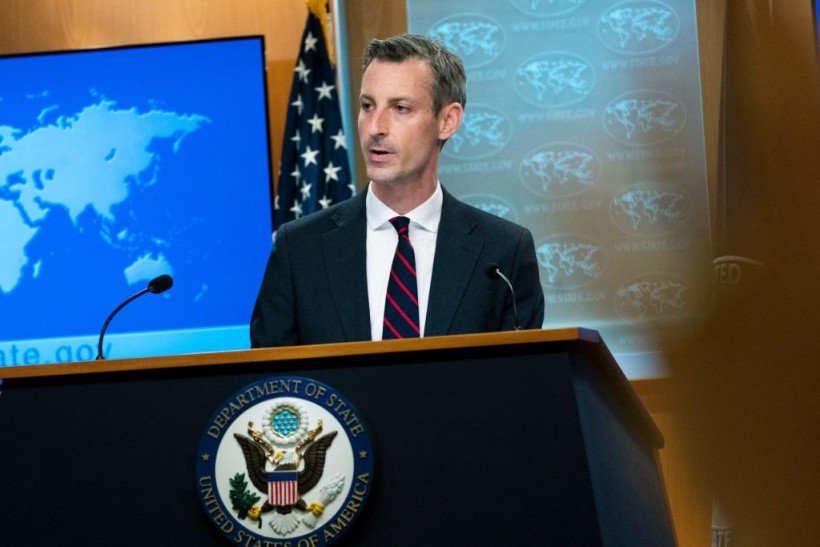
(Photo : MANUEL BALCE CENETA/POOL/AFP via Getty Image)
The United States declared on Friday its support for the recent Philippines protest calling on China "to end its provocative actions" in the South China Sea, according to the State Department.
The United States declared on Friday its support for the recent Philippines protest calling on China "to end its provocative actions and respect international law in the South China Sea," according to the State Department.
Last week, the Philippines filed further diplomatic protests over Chinese marine activity within Manila's exclusive economic zone of 200 miles (321 kilometers).
It accused China of "illegal fishing" while Chinese coast guard vessels followed Philippine boats on a resupply operation, adding to more than 300 complaints about Beijing's actions in the South China Sea.
US Shares Philippines' Concerns on China's Provocative Acts
According to the State Department, the US shares the Philippines' concerns.
State Department spokesperson Ned Price stated: "We share the Philippines' concerns regarding the PRC's provocative actions interfering with Philippine sovereign rights within the Philippine exclusive economic zone near Second Thomas Shoal and massing vessels near Whitsun Reef.
"These actions are part of a broader trend of PRC (People's Republic of China) provocations against South China Sea claimants and other states lawfully operating in the region," Price added, as per the US Department of State website.
In closing, the State Department noted, "The United States stands with our ally, the Philippines, in upholding the rules-based international order and freedom of navigation in the South China Sea, as guaranteed under international law."
The Philippines has lodged a new diplomatic protest against China's maritime activities within Manila's 200-mile exclusive economic zone, the foreign ministry one week ago, according to Reuters.
It was the second diplomatic protest by the ministry in June, adding to more than 300 complaints filed against Beijing's "illegal" activities in the South China Sea.
Read Also: US Sanctions 3 US Firms for Sending Technical Rocket Data to China
China engaged in "illegal fishing" while Chinese coast guard vessels shadowed Philippine boats on a resupply mission around its shoal, the foreign ministry said in a statement.
"China has no right to fish, monitor, or interfere with the Philippines' legitimate activities therein," the ministry added.
The Chinese operations, according to the ministry, occurred at the Second Thomas Shoal, which is claimed by both Beijing and Manila and is located 105 nautical miles (195 kilometers) off the coast of the Philippines' Palawan region.
Three Chinese coast guard ships obstructed and used water cannons on resupply boats in November, forcing the Philippines to abandon a supply mission in the atoll.
Despite an arbitration verdict in 2016 rejecting Beijing's claim to broad swaths of the South China Sea, China continues to assert its position in the key waterway.
Challenge for Philippines' President-Elect
The protest highlights the difficulties that President-elect Ferdinand Marcos Jr. faces in forging stronger economic connections with China while avoiding appearing to cave over what the military perceives as Beijing's unlawful maritime provocations.
Last week, Marcos described China as the Philippines' "strongest partner" during an award ceremony on promoting Philippines-China understanding.
Marcos added that the Philippines needs to collaborate with other countries that would help the country's economic recovery in a post-pandemic world.
Natural resources and human trade have long been abundant in the South China Sea per China-US Focus. More than $5 trillion in global trade is estimated to transit through the region each year, and explorations have uncovered significant natural gas and hydrocarbon deposits.
China, Vietnam, Malaysia, Brunei, the Philippines, and Taiwan all claim territory in the enormous expanse of islands, rocks, and archipelagos composing the South China Sea, causing tensions in the region.
Related Article: China: New Advanced Aircraft Carrier on Par With United States', Can Launch Fighter Jets With More Ammo








